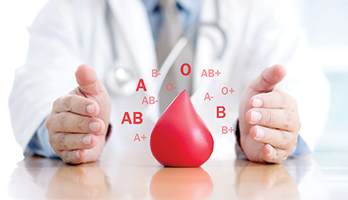Knowing your type could give clues to your risk of stroke and heart attack

Do you know your blood type? There’s a good chance that you don’t. More Americans know their horoscope sign (66 percent) than their blood type (51 percent), according to a survey published this year by medical laboratory company Quest Diagnostics.
There are compelling health reasons why you should know, especially when it comes to your heart. Research suggests that people with certain blood types – namely A and B – are at higher risk to develop blood clots and to have heart attacks and strokes.
“We think about blood type a lot when we think about transfusions,” says Robert Salazar, M.D., a cardiologist at Memorial Hermann Health System in Houston. There may be some benefits to know about it for heart health, he adds. “Increasingly, there is a push towards the individualization of medicine and medical advice,” he explains. Adding information about blood type, he says, may help inform doctors on how to best treat patients.
Blood types are determined by the presence or absence of certain substances, called antigens, that can trigger an immune response if they are foreign to the body.
There are four main blood types: A, B, O and AB, according to the American Red Cross. In addition to these antigens, there’s a protein called the Rh factor, which can either be present (+) or absent (-). That means there are eight blood subtypes: A+, A-, B+, B-, O+, O-, AB+, AB-.
TYPES A AND B AND BLOOD CLOTS
People with blood types A and B are at higher risk to develop blood clots compared with people who have type O blood, according to a 2020 study published by the American Heart Association. The study, which looked at more than 400,000 people, found that types A and B were 50 percent more likely to develop blood clots in the legs called deep vein thrombosis and 47 percent more likely to develop a pulmonary embolism – when a clot travels to the lungs – than people with type O blood. They were eight percent more likely to have a heart attack and 10 percent more likely to experience heart failure than type Os.
WHY BLOOD TYPE AFFECTS CLOT RISK
There are many possible reasons for why this happens, says Mary Cushman, M.D., a hematologist at the University of Vermont Medical Center and a professor of medicine and pathology at the Larner College of Medicine at UVM in Burlington, Vt.
“The enzyme that controls blood type has other actions,” she explains. One of these is to modify a protein called von Willebrand factor, which is very important in forming blood clots. “The modifications to the protein are different in different blood types,” she says. “So people with type O blood have the lowest levels of von Willebrand factor on average and the lowest risk of abnormal clots. Type AB has the highest level and, in some studies, the highest risk of blood clots.”
There may also be some differences in platelets, the small cell fragments in the blood that form clots, says Joshua Beckman, a cardiologist at the University of Texas Southwestern Medical Center. This may make you more susceptible to clotting.
TYPE A, TYPE AB AND CHOLESTEROL, STROKE
There’s evidence to suggest that type A blood is linked to higher levels of low-density lipoprotein (LDL) cholesterol, the waxy substance that clogs arteries. Type AB blood is linked to inflammation, which may adversely affect blood vessels. Larger studies need to be done before coming to any definite conclusions, Beckman says.
Blood type may impact stroke risk, too. A 2022 study published in the medical journal Neurology reviewed 48 studies of 17,000 stroke patients and found that people with type A were 16 percent more likely to have an early stroke than people with other blood types, and those with type O were 12 percent less likely. An earlier study done by Cushman found that blood type AB, compared with O, had a 1.8 times higher risk of stroke; other blood types weren’t affected.
BLOOD TYPE AND OTHER HEALTH RISKS
Scientists are studying how blood type might affect risks from the COVID-19 virus, but they say it’s too early to draw firm conclusions. Research has linked type O blood with a lower chance of getting seriously ill from cholera, and it may offer some protection from severe malaria.
It’s important to keep research findings in context. Though certain blood types could mean an increased chance of health problems such as blood clots and stroke, the risk is relatively small compared with the dangers of smoking and high blood pressure, and blood type doesn’t tell you much about your personal risk.
HOW TO FIND OUT YOUR BLOOD TYPE
A simple blood test can reveal your blood type. If you’re curious, you can ask your doctor to have it tested the next time you need bloodwork. There’s another very quick and easy way to figure out your blood type that’s also altruistic: Give blood.
A 2019 national survey conducted by the Red Cross found that more than half of people believe they need to know their blood type to do so, but that’s not true. Once you give blood, you’ll learn your blood type when you receive your donor card, and you can create a profile through the Red Cross Blood Donor App. Slightly more than a third – 37 percent – of the world’s population has the most frequently occurring blood type, O+.
Blood type and your health
What the research shows:
• Types A and B – Higher risk of blood clots, heart attacks and strokes.
• Type AB – Higher risk of stroke and inflammation. Those with AB+ blood can accept blood from all donors and are called universal recipients.
• Type O – Slightly lower risk of thrombosis, blood clots, heart attacks and strokes. People with type O- blood are universal donors and can donate to anyone.
Note that a healthy lifestyle likely trumps blood type in terms of increasing or decreasing risks.


